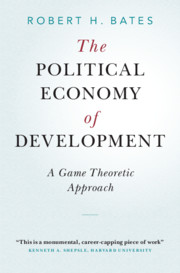Book contents
- The Political Economy of Development
- Cambridge Studies in Comparative Politics
- The Political Economy of Development
- Copyright page
- Dedication
- Contents
- Figures
- A Note to the Reader
- 1 Introduction
- 2 Societies without States
- 3 An Impossibility Result?
- 4 From Kinship to the State
- 5 Restraining the Leviathan: Part I
- 6 Restraining the Leviathan: Part II
- 7 The Political Impetus for the Great Transformation
- 8 Shaping the Path of Growth and Development
- 9 Conclusion
- Index
- Other Books in the Series (continued from page iii)
6 - Restraining the Leviathan: Part II
Published online by Cambridge University Press: 07 February 2021
- The Political Economy of Development
- Cambridge Studies in Comparative Politics
- The Political Economy of Development
- Copyright page
- Dedication
- Contents
- Figures
- A Note to the Reader
- 1 Introduction
- 2 Societies without States
- 3 An Impossibility Result?
- 4 From Kinship to the State
- 5 Restraining the Leviathan: Part I
- 6 Restraining the Leviathan: Part II
- 7 The Political Impetus for the Great Transformation
- 8 Shaping the Path of Growth and Development
- 9 Conclusion
- Index
- Other Books in the Series (continued from page iii)
Summary
Restraining the Leviathan, Part 2: Private control of the means of production renders it necessary for those with power to bargain those with wealth.
- Type
- Chapter
- Information
- The Political Economy of DevelopmentA Game Theoretic Approach, pp. 52 - 66Publisher: Cambridge University PressPrint publication year: 2020

